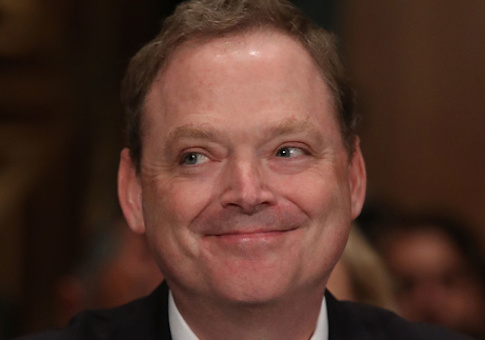Kevin Hassett, the chairman of the Council of Economic Advisers, says that lowering the corporate tax rate to 20 percent, as part of President Donald Trump's tax reform proposal suggests, could help lift GDP by 4 percent in the first year.
Speaking to the Tax Policy Center and the Tax Foundation, Hassett said the plan is pro-growth, pro-work, and will increase economic output and growth.
The plan lowers the corporate income tax rate from 35 percent to 20 percent, which will contribute to GDP growth.
"Just to illustrate the scale of these effects, a rough preliminary estimate of the combined revenue effect of the corporate tax proposal, combined with these macro elasticity estimates, implies that tax cuts of this scale would lift GDP per capita by approximately 4 percent over the first year," Hassett said. "Although there are a number of reasons to expect that the actual impact of the reform would be much smaller than that, including the fact that we are currently near full employment, the potential for a significant growth effect is still very reasonable and empirically valid."
In addition to slashing rates, Hassett says the framework allows corporations to write off new investment and keeps research and development and low-income housing credits. For family-owned and small businesses, the framework reduces rates to 25 percent.
"When you get more of an economic input like work, you get more economic output—and you get more economic growth," Hassett said. "And on the corporate side, companies will no longer be incentivized to offshore, and what they save in taxes should help raise corporate investment and wages."
Hassett points out that even former President Barack Obama proposed lowering the corporate tax rate to 28 percent. "My guess is that President Obama did not make that proposal because he thought it would have no effect."
"In France, a country not exactly known for its longstanding devotion to supply-side economics," Hassett said, "President Emmanuel Macron has proposed cutting the corporate tax rate to 25 percent. And France’s current corporate rate of 33 percent is already lower than ours. France joins such countries as Denmark, Sweden, and Greece—a country that recently elected an avowedly socialist government named the Coalition of the Radical Left or SYRIZA in Greek—in having lower corporate tax rates than our own."
For individuals, the framework creates brackets of zero, 12, 25, and 35 percent, and increases the number of people who are eligible for a zero rate.
"It is scientifically indefensible to say—as the [Tax Policy Center] report of last Friday does—that the framework [would] have little macroeconomic feedback effect," Hassett said. "It is simply inconsistent, with mountains of evidence that I am about to discuss, to have no growth effects from tax changes this significant."
Hassett says that economists have come to a consensus that broadening the base and lower marginal tax rates boost well-being and economic growth.
"I have been in this room often over the past 20 years and have witnessed head-nodding that broadening the base and lowering the rates, as President Trump’s plan aims to do, is a recipe for better tax policy," he said. "I can’t recall ever seeing anyone in this room argue that narrowing the base and raising rates was a recipe for growth."
Updated 3 p.m.: CEA chairman Hassett was generalizing on the positive impact of reducing tax rates to boost growth and not the overall Trump tax plan, which still needs to be studied.
